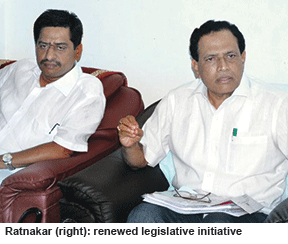The obstinate refusal of the Congress government, voted to power in the legislative assembly election of May 2013, to accept several verdicts of the Karnataka high court and the Supreme Court which have struck down a 1994 government order making Kannada or the mother tongue the medium of instruction in all primary schools (class I-V) statewide, has aroused deep suspicion of the motives and machinations of the state’s discredited leadership.
 On March 26, the Congress government tabled two bills — the Karnataka Language Learning Bill, 2015, which seeks to make Kannada language a compulsory subject in classes I-X in all state board-affiliated schools, and an amendment to the Right to Free and Compulsory Education Act, 2009 (aka RTE Act) mandating Kannada or mother tongue as the medium of instruction in primary schooling — in the legislative assembly. “It is part of our commitment and endeavour to protect and promote Kannada in the state,” primary and secondary education minister Kimmane Ratnakar said while tabling the bills in the assembly.
On March 26, the Congress government tabled two bills — the Karnataka Language Learning Bill, 2015, which seeks to make Kannada language a compulsory subject in classes I-X in all state board-affiliated schools, and an amendment to the Right to Free and Compulsory Education Act, 2009 (aka RTE Act) mandating Kannada or mother tongue as the medium of instruction in primary schooling — in the legislative assembly. “It is part of our commitment and endeavour to protect and promote Kannada in the state,” primary and secondary education minister Kimmane Ratnakar said while tabling the bills in the assembly.
This legislative initiative comes hard on the heels of the Supreme Court’s March 21 dismissal of a curative petition filed by the Karnataka state government to review its May 6, 2014 verdict quashing the 1994 (Congress) government order mandating Kannada or mother tongue as the compulsory medium of instruction in all primary schools. Last May, in State of Karnataka & Anr. vs. Associated Managements of (Government Recognised Unaided English Medium) Primary & Secondary Schools & Ors, the apex court ruled that the state government cannot stipulate medium of instruction as a condition for recognition of private schools, and that the right to freedom of expression under Article 19 (1) (a) of the Constitution includes the right of parents to choose the medium of instruction of their children.
Despite this unanimous and unambiguous Supreme Court judgement (which upheld a 2008 Karnataka high court order to the same effect), the state government refused to grant recognition to the state’s estimated 6,300 English-medium schools pending the hearing of its curative petition which was dismissed on March 21. Instead, the state government has tabled the two new bills in brazen defiance of the higher judiciary.
The machinations of the state government to circumvent several court judgements to forcefully introduce Kannada or mother tongue as medium of instruction in primaries, have not surprised the state’s private unaided school managements, who have been subjected to continuous interference and shakedowns by corrupt officials of successive governments for ‘illegally’ running English-medium schools for over two decades. “With the Supreme Court rejecting its curative petition, all doors are closed for the state government. It has no option but to legally recognise English-medium schools which were forced to give undertakings that they would teach only in Kannada,” says V.R.N. Reddy, president of the Karnataka Unaided Schools Management Association (KUSMA).
Behind the dogged obduracy of state government politicians to sanction English language teaching, is a murky mix of language chauvinism and commercial calculation. Confronted with mass migration of children from Kannada-medium government schools into private English-medium primary-cum-secondaries, successive state governments have resorted to forcing private primaries, secondaries and even higher education institutions to adopt Kannada as the medium of instruction. Although preservation of Kannada language and culture is the fig leaf, it’s well-known that language chauvinism serves the business interests of well-connected vernacular textbook publishers and printers set to lose captive markets for regional language textbooks of dubious quality and scholarship.
According to Dr. A.S. Seetharamu, education advisor to the Karnataka government, the state government needs to “gracefully accede” to the popular public demand for English-medium education, and redirect its energies to improving government schools. “It’s high time the government ends its appeasement of the Kannada language lobby. The bills, even if passed, will be struck down by the courts. The only solution for the government is to urgently focus on improving its schools to stem the swelling exodus of students to private schools,” he says.
However, such rational counsel is unlikely to cut much ice with Karnataka’s command-and-control politicians and educracy long accustomed to lording it over private schools. Another battle in the courts is in the offing.
Balasubramaniam K. (Bangalore)